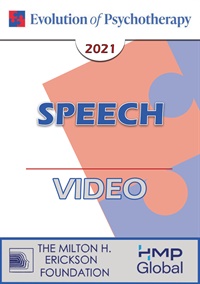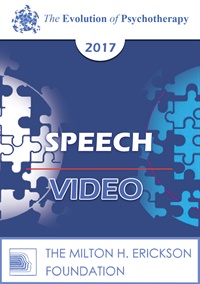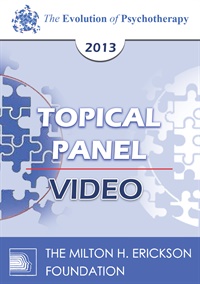- Average Rating:
- Not yet rated
- Topic Areas:
- Feedback Informed Treatment (FIT) | Psychotherapy | Speeches | Therapist Development
- Categories:
- Evolution of Psychotherapy | Evolution of Psychotherapy 2021
- Faculty:
- Scott Miller, PhD
- Course Levels:
- Master Degree or Higher in Health-Related Field
- Duration:
- 1 hour
- Format:
- Audio and Video
- Original Program Date:
- Dec 04, 2021
- Short Description:
- What can mental health professionals do to enhance their performance? Available evidence makes clear that attending a typical continuing education workshop, specializing in the treatment of a particular problem, or learning a new treatment model does little to improve effectiveness. In fact, studies to date indicate clinical effectiveness actually declines with time and experience in the field. The key to improved performance is engaging in deliberate practice. At this workshop, the latest research on deliberate practice will be translated into concrete steps all clinicians can immediately apply in their efforts to achieve better results.
- Price:
- $59.00 - Base Price
- Average Rating:
- Not yet rated
- Topic Areas:
- Keynotes | Psychotherapy | Therapist Development
- Categories:
- Erickson Congress | Erickson Congress 2019
- Faculty:
- Scott Miller, PhD
- Course Levels:
- Master Degree or Higher in Health-Related Field
- Duration:
- 50 Minutes
- Format:
- Audio and Video
- Original Program Date:
- Dec 12, 2019
- Short Description:
- What can mental health professionals do to enhance their performance? Available evidence makes clear that clear that attending a typical continuing education workshop, specializing in the treatment of a particular problem, or learning a new treatment model does little to improve effectiveness. In fact, studies to date indicate clinical effectiveness actually declines with time and experience in the field.
- Price:
-
Sale is $29.00
price reduced from Base Price - $59.00
Credit available - Click Here for more information
- Average Rating:
- Not yet rated
- Topic Areas:
- Speeches | Research | Psychotherapy
- Categories:
- Evolution of Psychotherapy | Evolution of Psychotherapy 2017 | Online Continuing Education
- Faculty:
- Scott Miller, PhD
- Course Levels:
- Master Degree or Higher in Health-Related Field
- Duration:
- 1:01:47
- Format:
- Audio and Video
- Original Program Date:
- Dec 15, 2017
- Short Description:
- Psychotherapy is remarkably effective. Fifty years of research provides overwhelming empirical support for the practice. At the same time, study after study shows that the majority of people who could benefit from seeing a therapist never go. Put more bluntly, they would never even consider going. Of those who start, between 25 and 50% unilaterally discontinue prior to experiencing any benefit from the service. Stigma, ignorance, denial, and lack of motivation are the most common reasons cited by professionals for people either not seeking help or dropping out of treatment. Research provides another explanation.
- Price:
-
Sale is $29.00
price reduced from Base Price - $59.00
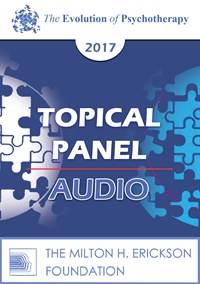
- Average Rating:
- Not yet rated
- Topic Areas:
- Topical Panels | Psychotherapy | Experiential Therapy | Therapist Development | Training
- Bundle(s):
- Learning Track - EP17 Psychotherapy Download
- Categories:
- Evolution of Psychotherapy | Evolution of Psychotherapy 2017 | Evolution of Psychotherapy Psychotherapy Learning Track
- Faculty:
- Donald Meichenbaum, PhD | Jeffrey Zeig, PhD | Scott Miller, PhD
- Duration:
- 1:01:43
- Format:
- Audio Only
- Original Program Date:
- Dec 15, 2017
- Short Description:
- Psychotherapists can be trained through didactic, research-based, and experiential approaches. These approaches will be compared and contrasted.
- Price:
- $15.00 - Base Price
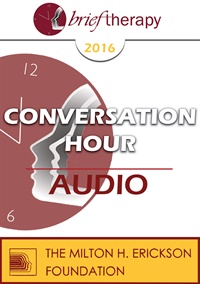
- Average Rating:
- Not yet rated
- Topic Areas:
- Conversation Hours | Brief Therapy
- Categories:
- Brief Therapy Conference | Brief Therapy Conference 2016
- Faculty:
- Scott Miller, PhD
- Duration:
- 1:02:23
- Format:
- Audio Only
- Original Program Date:
- Dec 10, 2016
- Short Description:
- BT16 Conversation Hour 4 - Scott Miller, PhD Conversation Hour with Scott Miller, PhD
- Price:
- $15.00 - Base Price
Tags: Brief Therapy Scott Miller
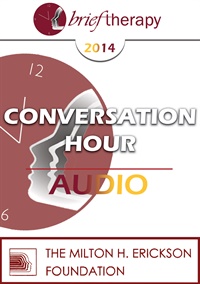
- Average Rating:
- Not yet rated
- Topic Areas:
- Conversation Hours | Brief Therapy
- Categories:
- Brief Therapy Conference | Brief Therapy Conference 2014
- Faculty:
- Scott Miller, PhD
- Duration:
- 57:02
- Format:
- Audio Only
- Original Program Date:
- Dec 13, 2014
- Short Description:
- BT14 Conversation Hour 02 - Scott Miller, PhD Educational Objectives: Learn the philosophies of various practitioners and theorists.
- Price:
- $15.00 - Base Price
Tags: Brief Therapy Scott Miller
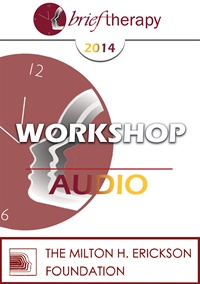
- Average Rating:
- Not yet rated
- Topic Areas:
- Workshops | Feedback Informed Treatment (FIT) | Tailoring | Therapist Development | Psychotherapy | Brief Therapy
- Categories:
- Brief Therapy Conference | Brief Therapy Conference 2014
- Faculty:
- Scott Miller, PhD
- Duration:
- 1:42:31
- Format:
- Audio Only
- Original Program Date:
- Dec 12, 2014
- Short Description:
- It’s not a pretty picture. Available evidence indicates that the effectiveness of psychotherapy has not improved in spite of 100 years of theorizing and research. What would help? Not learning a new model of therapy or the “latest” so-called “evidence-based” treatment approach. And no, not attending another CEU event or sorting through that stack of research journals by your desk. A simple, valid, and reliable alternative exists for maximizing the effectiveness and efficiency of treatment based on using ongoing client feedback to empirically tailor services to the individual client needs and characteris- tics.
- Price:
- $15.00 - Base Price
- Average Rating:
- Not yet rated
- Topic Areas:
- Psychotherapy | Topical Panels | Research
- Categories:
- Evolution of Psychotherapy | Evolution of Psychotherapy 2013
- Faculty:
- David Barlow, PhD | Steven Hayes, PhD | Scott Miller, PhD
- Course Levels:
- Master Degree or Higher in Health-Related Field
- Duration:
- 59:47
- Format:
- Audio and Video
- Original Program Date:
- Dec 14, 2013
- Short Description:
- EP13 Topical Panel 16 - Research in Psychotherapy - David Barlow, PhD, Steven Hayes, PhD, and Scott Miller, PhD
- Price:
-
Sale is $29.00
price reduced from Base Price - $59.00
- Average Rating:
- Not yet rated
- Topic Areas:
- Clinical Demonstrations | Psychotherapy | Feedback Informed Treatment (FIT) | Relationships | Therapeutic Relationship | Tailoring | Therapist Development
- Categories:
- Evolution of Psychotherapy | Evolution of Psychotherapy 2013
- Faculty:
- Scott Miller, PhD
- Course Levels:
- Master Degree or Higher in Health-Related Field
- Duration:
- 1:00:38
- Format:
- Audio and Video
- Original Program Date:
- Dec 13, 2013
- Short Description:
- Feedback-Informed Treatment (FIT) dramatically improves both retention and outcome of behavioral health services. FIT involves routinely and formally soliciting feedback from clients regarding the therapeutic alliance and outcome of care and using the resulting information to inform and tailor service delivery. Dr. Miller will demonstrate how clinicians can integrate FIT into their work regardless of theoretical orientation or professional discipline.
- Price:
-
Sale is $29.00
price reduced from Base Price - $59.00
- Average Rating:
- Not yet rated
- Topic Areas:
- Dialogues | Psychotherapy | Therapist Development
- Categories:
- Evolution of Psychotherapy | Evolution of Psychotherapy 2013
- Faculty:
- Scott Miller, PhD | Donald Meichenbaum, PhD
- Course Levels:
- Master Degree or Higher in Health-Related Field
- Duration:
- 1:01:43
- Format:
- Audio and Video
- Original Program Date:
- Dec 13, 2013
- Short Description:
- EP13 Dialogue 02 – Expertise and Psychotherapy: What are the Core Tasks of Psychotherapy? – Donald Meichenbaum, PhD and Scott Miller, PhD Moderator: Robert Bohanske, PhD Educational Objectives: Given a topic, describe the differing approaches to psychotherapy, and identify the strengths and weaknesses of each approach.
- Price:
-
Sale is $29.00
price reduced from Base Price - $59.00
- Average Rating:
- Not yet rated
- Topic Areas:
- Psychotherapy | Invited Addresses | History of Psychotherapy
- Categories:
- Evolution of Psychotherapy | Evolution of Psychotherapy 2013
- Faculty:
- Scott Miller, PhD
- Course Levels:
- Master Degree or Higher in Health-Related Field
- Duration:
- 56:15
- Format:
- Audio and Video
- Original Program Date:
- Dec 13, 2013
- Short Description:
- Since the first “Evolution” conference in 1985, thousands of research studies and how-to books on psychotherapy have been published. Workshops, training programs, and certifications abound. At the same time, the overall effectiveness of psychotherapy has not improved a single percentage point. Meanwhile, practitioners face the most challenging economic practice climate in the field’s history. Incomes are down and fewer people are seeking psychotherapy as a remedy to their problems.
- Price:
-
Sale is $29.00
price reduced from Base Price - $59.00
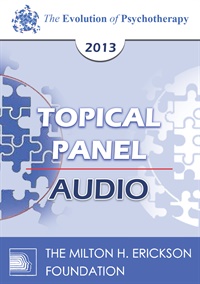
- Average Rating:
- Not yet rated
- Topic Areas:
- Psychotherapy | Topical Panels | Therapist Development | Training
- Categories:
- Evolution of Psychotherapy | Evolution of Psychotherapy 2013
- Faculty:
- Jon Carlson | Scott Miller, PhD | William Miller, PhD
- Duration:
- 1 Hour 4 Minutes
- Format:
- Audio Only
- Original Program Date:
- Dec 13, 2013
- Short Description:
- EP13 Topical Panel 07 - Training in Psychotherapy - Jon Carlson, PsyD, Scott Miller, PhD, and William Miller, PhD Moderator: Betty Alice Erickson, MS Education Objectives: Compare and contrast clinical and philosophical perspective of experts.
- Price:
- $15.00 - Base Price
- Average Rating:
- Not yet rated
- Topic Areas:
- Workshops | Psychotherapy | Therapist Development
- Categories:
- Evolution of Psychotherapy | Evolution of Psychotherapy 2013
- Faculty:
- Scott Miller, PhD
- Course Levels:
- Master Degree or Higher in Health-Related Field
- Duration:
- 2:38:35
- Format:
- Audio and Video
- Original Program Date:
- Dec 11, 2013
- Short Description:
- Pulitzer prize winning author Thomas Friedman recently observed, “The era of average is over. In the 21st century, everyone is going to have to find something extra to stand out in their field.” What can mental health and substance abuse professionals do to enhance their performance? Available evidence makes clear that attending a typical continuing education workshop, specializing in the treatment of a particular problem, or learning a new treatment model does little to improve effectiveness. Over the last decade, Scott D. Miller, Ph.D., together with colleagues at the International Center for Clinical Excellence, have been tracking the outcomes of thousands of clinicians around the world. Along the way, they have identified specific practices that separate highly effective from average clinicians.
- Price:
-
Sale is $29.00
price reduced from Base Price - $59.00

- Average Rating:
- Not yet rated
- Topic Areas:
- Dialogues | Psychotherapy
- Categories:
- Evolution of Psychotherapy | Evolution of Psychotherapy 2009
- Faculty:
- Donald Meichenbaum, PhD | Scott Miller, PhD
- Duration:
- 1 Hour 7 Minutes
- Format:
- Audio Only
- Original Program Date:
- Dec 11, 2009
- Short Description:
- EP09 Dialogue 09 – Evidenced-Based Practice – Donald Meichenbaum, PhD and Scott Miller, PhD Educational Objective: Given a topic, to describe the differing approaches to psychotherapy, and to identify the strengths and weaknesses of each approach.
- Price:
- $15.00 - Base Price
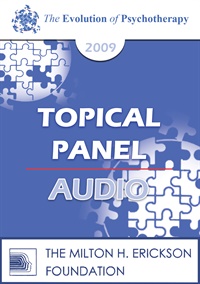
- Average Rating:
- Not yet rated
- Topic Areas:
- Psychotherapy | Topical Panels | Research
- Categories:
- Evolution of Psychotherapy | Evolution of Psychotherapy 2009
- Faculty:
- David Barlow, PhD | Steven Hayes, PhD | Scott Miller, PhD
- Duration:
- 1 Hour 2 Minutes
- Format:
- Audio Only
- Original Program Date:
- Dec 11, 2009
- Short Description:
- EP09 Topical Panel 04 – Research in Psychotherapy – David Barlow, Steven Hayes, and Scott Miller Educational Objective: To compare and contrast clinical and philosophical perspectives of experts
- Price:
- $15.00 - Base Price
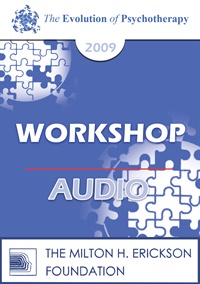
- Average Rating:
- Not yet rated
- Topic Areas:
- Workshops | Psychotherapy | Therapist Development
- Categories:
- Evolution of Psychotherapy | Evolution of Psychotherapy 2009
- Faculty:
- Scott Miller, PhD
- Duration:
- 2 Hours 51 Minutes
- Format:
- Audio Only
- Original Program Date:
- Dec 09, 2009
- Short Description:
- Thanks to a number of recent studies, there is now solid empirical evidence for what distinguishes highly effective therapists.In this workshop, participants will learn in detail the qualities and practices that separate the great from the good. Participants also will find out about a system of feedback procedures that can be used to develop a profile of their most and least effective moments in therapy – what works and what doesn’t. Not only will attendees get a far more exact idea of their clinical strengths and weaknesses, and how to use the findings in which to improve their own practice, but they also will come away with concrete tools that will immediately boost clinical abilities and effectiveness.
- Price:
- $15.00 - Base Price
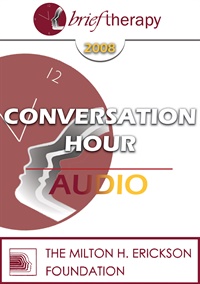
- Average Rating:
- Not yet rated
- Topic Areas:
- Conversation Hours | Brief Therapy | Psychotherapy | Therapist Development
- Categories:
- Brief Therapy Conference | Brief Therapy Conference 2008
- Faculty:
- Scott Miller, PhD
- Duration:
- 57:17
- Format:
- Audio Only
- Original Program Date:
- Dec 13, 2008
- Short Description:
- BT08 Conversation Hour 09 - Factors Leading to Successful Treatment - Scott Miller, PhD
- Price:
- $15.00 - Base Price
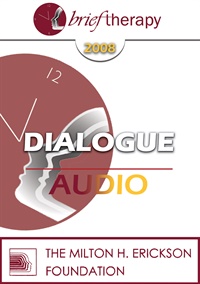
- Average Rating:
- Not yet rated
- Topic Areas:
- Dialogues | Brief Therapy | Therapist Development
- Categories:
- Brief Therapy Conference | Brief Therapy Conference 2008
- Faculty:
- Jeffrey Kottler, PhD | Scott Miller, PhD
- Duration:
- 59:10
- Format:
- Audio Only
- Original Program Date:
- Dec 13, 2008
- Short Description:
- BT08 Dialogue 03 - Limits of Brief Therapy - Jeffrey Kottler, PhD, Scott Miller, PhD
- Price:
- $15.00 - Base Price
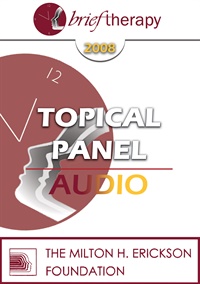
- Average Rating:
- Not yet rated
- Topic Areas:
- Topical Panels | Brief Therapy | Goals of the Therapist
- Categories:
- Brief Therapy Conference | Brief Therapy Conference 2008
- Faculty:
- Scott Miller, PhD | Erving Polster, PhD | John C. Norcross, PhD | James Prochaska, PhD
- Duration:
- 1:00:37
- Format:
- Audio Only
- Original Program Date:
- Dec 13, 2008
- Short Description:
- BT08 Topical Panel 01 - Setting Goals in Brief Therapy - Scott Miller, PhD, John Norcross, PhD, Erving Polster, PhD, James Prochaska, PhD
- Price:
- $15.00 - Base Price
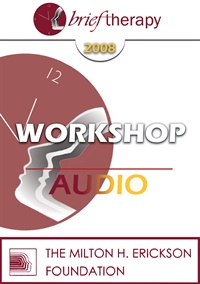
- Average Rating:
- Not yet rated
- Topic Areas:
- Workshops | Brief Therapy | Therapist Development
- Categories:
- Brief Therapy Conference | Brief Therapy Conference 2008
- Faculty:
- Scott Miller, PhD
- Duration:
- 2:20:45
- Format:
- Audio Only
- Original Program Date:
- Dec 12, 2008
- Short Description:
- Thanks to a number of recent studies, there is now solid empirical evidence for what distinguishes highly effective therapists. In this workshop, participants will learn in detail the qualities and practices that separate the great from the good. Participants also will find out about a system of feedback procedures that can be used to develop a profile of their most and least effective moments in therapy - what works and what doesn't. Not only will attendees get a far more exact idea of their clinical strengths and weaknesses and how to use the findings to improve their own practice, but they will also come away with concrete tools that will immediately boost clinical abilities and effectiveness.
- Price:
- $15.00 - Base Price
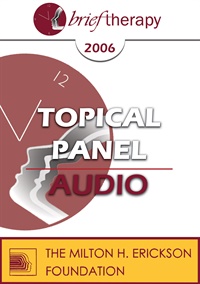
- Average Rating:
- Not yet rated
- Topic Areas:
- Topical Panels | Art and Creativity | Psychotherapy | Brief Therapy
- Categories:
- Brief Therapy Conference | Brief Therapy Conference 2006
- Faculty:
- Stephen Lankton, MSW | Scott Miller, PhD | Erving Polster, PhD | Frances Vaughan, PhD
- Duration:
- 59:19
- Format:
- Audio Only
- Original Program Date:
- Dec 08, 2006
- Short Description:
- BT06 Topical Panel 02 - Psychotherapy: Art or Science? - Stephen Lankton, MSW, DAHB, Scott Miller, PhD, Erving Polster, PhD, Frances Vaughan, PhD
- Price:
- $15.00 - Base Price
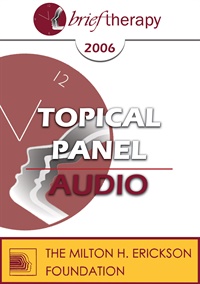
- Average Rating:
- Not yet rated
- Topic Areas:
- Topical Panels | Brief Therapy | Goals of the Therapist | Therapist Development
- Categories:
- Brief Therapy Conference | Brief Therapy Conference 2006
- Faculty:
- Stephen Gilligan, PhD | Pat Love, EdD | Scott Miller, PhD | John C. Norcross, PhD
- Duration:
- 1:00:19
- Format:
- Audio Only
- Original Program Date:
- Dec 08, 2006
- Short Description:
- BT06 Topical Panel 11 - Setting Goals in Brief Therapy - Stephen Gilligan, PhD, Pat Love, EdD, Scott Miller, PhD, John Norcross, PhD
- Price:
- $15.00 - Base Price

- Average Rating:
- Not yet rated
- Topic Areas:
- Workshops | Research | Brief Therapy | History of Psychotherapy | Psychotherapy
- Categories:
- Brief Therapy Conference | Brief Therapy Conference 2006
- Faculty:
- Scott Miller, PhD
- Duration:
- 2:03:53
- Format:
- Audio Only
- Original Program Date:
- Dec 07, 2006
- Short Description:
- At last count, over 400 separate models of psychotherapy have been found to exist (Garfield & Bergin, 1994). Despite the claims and promises made by the proponents of the various treatment models, 40 years of increasingly sophisticated outcome research has not found any one model or technique superior for the resolution of the problems that clients bring into treatment, Indeed, most of the research has only confirmed "common sense" (Frank 1993). In this workshop, forty years of outcome research will be translated into practical, common sense and empirically supported therapeutic skills that you can use for the efficient and effective resolution of the problems that clients bring to treatment.
- Price:
- $15.00 - Base Price

- Average Rating:
- Not yet rated
- Topic Areas:
- Topical Panels | Addiction | Psychotherapy | Ethical Practice | Supervision
- Categories:
- Evolution of Psychotherapy | Evolution of Psychotherapy 2005 | Pioneers in Couples and Family Therapy
- Faculty:
- Claudia Black, PhD | Robert Dilts, BA | James Hillman, PhD | Scott Miller, PhD
- Duration:
- 58 Minutes
- Format:
- Audio Only
- Original Program Date:
- Dec 10, 2005
- Short Description:
- Addiction experts examine the complex nature of addiction, discussing innovative treatment approaches including NLP, therapeutic alliance, and family interventions. The discussion covers multi-level treatment strategies, the impact of trauma, co-occurring disorders, and the critical role of personalized care in helping individuals overcome substance and behavioral addictions. Moderated by Betty Alice Erickson.
- Price:
- $15.00 - Base Price
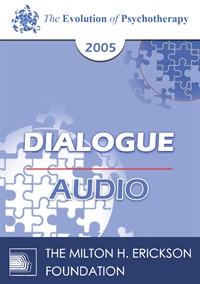
- Average Rating:
- Not yet rated
- Topic Areas:
- Dialogues | Psychotherapy
- Categories:
- Evolution of Psychotherapy | Evolution of Psychotherapy 2005
- Faculty:
- Nicholas Cummings, PhD | Scott Miller, PhD
- Duration:
- 55 Minutes
- Format:
- Audio Only
- Original Program Date:
- Dec 09, 2005
- Short Description:
- Dialogue 05 from the Evolution of Psychotherapy 2005 - Evidence-Based Practice Featuring Nicholas Cummings, PhD, and Scott Miller, PhD Moderated by Jeffrey Kottler, PhD
- Price:
- $15.00 - Base Price


